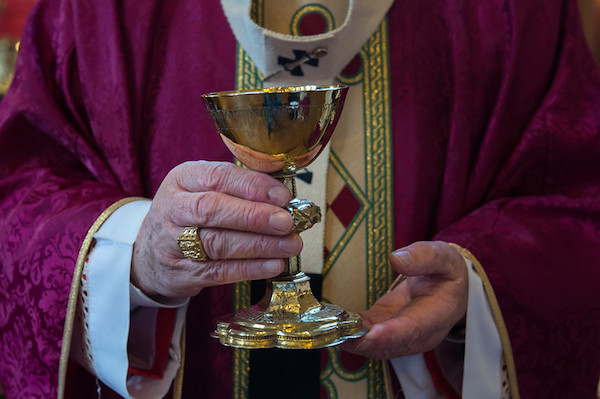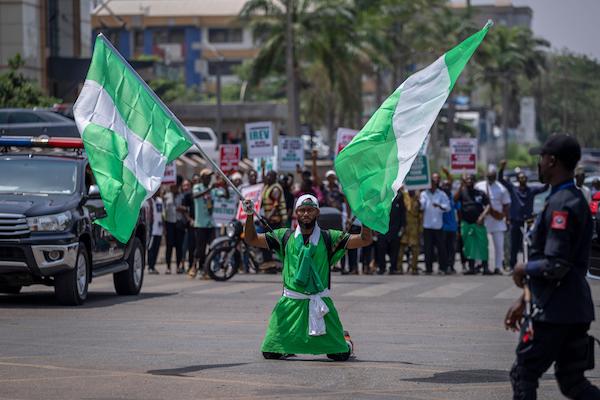Election observers and opposition parties in Nigeria have challenged the result of the presidential election, after Bola Ahmed Tinubu was declared the winner.
The Independent National Electoral Commission announced on 1 March that Tinubu – of the All Progressives Congress (APC), party of the outgoing President Muhammadu Buhari – had won 8.8 million votes, 36.6 per cent of the total cast on 25 February.
Among 17 other candidates, Atiku Abubakar of the People’s Democratic Party (PDP) received almost seven million votes (28 per cent) and Peter Obi of the Labour Party received six million (24 per cent).
The electoral commission reported a turnout of 27 per cent of almost 90 million eligible voters.
On 28 February, the main opposition parties made a joint statement that the results were “seriously falsified and manipulated” during the four-day count.
International observers reported logistical failings at polling booths and violence at the fringes of the process.
Joyce Banda, the head of the international delegation of observers and former President of Malawi, congratulated Nigerians on their “perseverance and enthusiasm” and “strong desire to make their voices heard”.
However, she noted that “logistical inadequacies created tensions” while “problems with electronically transmitting results and uploading them to a public portal in a timely manner undermined public confidence at a crucial moment”.
Controversy surrounds the use of the electronic Bimodal Voter Accreditation System to prevent voter fraud. Opposition groups say that the system was deliberately mismanaged.
Caritas Nigeria, which deployed 6,000 accredited observers alongside the 10,000 citizen observers across Nigeria’s 36 states, accused the electoral commission of “sabotage and crass complicity” and called its excuses “puerile and unjustified”.
In a briefing before Wednesday’s announcement of the result, Fr Uchechukwu Obodoechina, executive secretary of Caritas Nigeria, announced the charity’s “total disappointment with the snail-pace deployment” of election materials to more than half of polling stations.
Many opened late on polling day and were severely overcrowded, which the international delegation warned may have compromised the secrecy of the ballot.
Nigeria’s Catholic bishops also expressed grave doubts about the voting process.
In a statement on Wednesday, the Archbishop of Owerri, Lucius Iwejuru Ugorji, president of the bishops’ conference, said that “the human element [at polling stations] compromised the expected benefits of the new electoral law”.
He also noted the delay in transmission of the electronic results.
“There is, therefore, palpable tension in the air and agitation not by some political parties but by a cross-section of the Nigerian population,” the archbishop said.
The electoral commission, he said, must now “ensure that the sanctity of the collective will of the electorate is not violated, so as to restore the confidence of the citizenry in our government and its institutions”.
President-elect Tinubu has denied serious failings in the process, insisting that irregularities “were relatively few in number and were immaterial to the final outcome”.
He immediately formed a reconciliation committee with the opposition candidates, but a spokesman for the PDP refused “to rubber stamp the electoral fraud” while the Labour Party promised to challenge the result in court.
“This is the worst election since Nigeria re-entered civilian rule in 1999,” Yakuba Baw, a Labour Party lawyer, told CNA.
Both Tinubu and his vice-president, Kashim Shettima, are Muslims, breaking with the informal custom of including both Muslim and Christian representation on an election ticket.
Nigeria’s Christians faces worsening persecution in the north of the country. CNA reported that 10 Christian famers in Benue State were murdered for voting after Fulani terrorists had warned them not to attend the poll.
The government’s failure to address widespread violence, and long-term discontent with the APC, had fostered expectation of a change of government.
Despite his overall victory, Tinubu, a former governor of Lagos, lost the city to the Labour Party’s Obi, a Catholic and political outsider noted for his unorthodox campaign and popularity with young voters.



 Loading ...
Loading ...